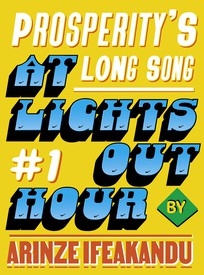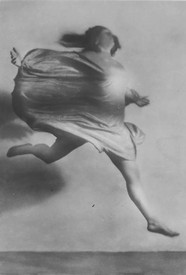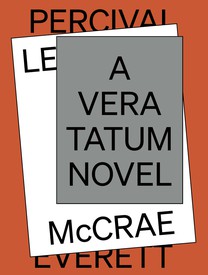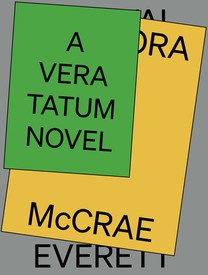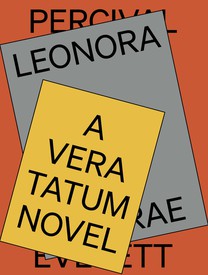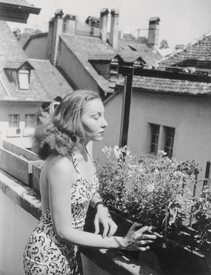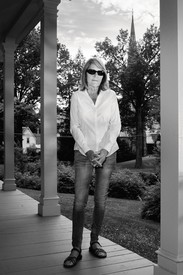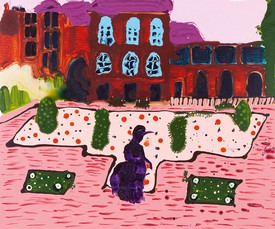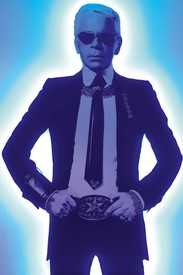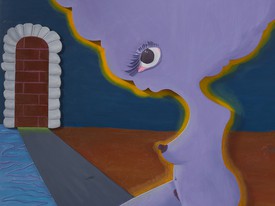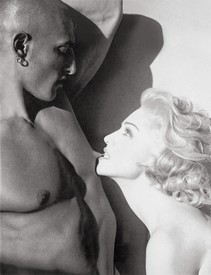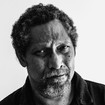
Percival Everett is the author of twenty-two novels and four collections of stories. His novels include The Trees (2021), Telephone (2020), So Much Blue (2017), and Erasure (2001). He has received awards from the Guggenheim Foundation and Creative Capital. He lives in Los Angeles, where he is distinguished professor of English at the University of Southern California.
1
The shadows of mountain mahogany and sage stretched west across the valley floor below, shortened, and finally reached eastward and would soon be gone, disappeared into the ghostly flurries of snow that had come from nowhere and promised to leave nothing. Gray drapes of rain moved up from the south, warmer air. The woman calculated that she had a couple of hours left before the weather found her. Enough time to put away the horses and walk the dogs.
Her name was Vera. It was a name she had never liked. She thought of it as an old woman’s name, a name from a different era. She knew that one day it would be an old woman’s name. People often commented, but she couldn’t tell them it had been her grandmother’s or great-grand’s or even a great-aunt’s name. It had merely been a whim of her mother’s, whose name was Lauren, a young woman’s name, Vera thought, a whim that had not been met with adequate objection by her father, Sean, a young man’s name. Her father’s response to Vera’s childhood complaint was, “You should have heard your mother’s first choice.” Her parents had referred to themselves as retired hippies.
Vera called it walking the dogs, but it was more an accompaniment. Mutt and Mongrel, both the color of dusk, ran wildly through the brush, also the color of dusk, while she served as a sort of home base, surprised by each explosion of reappearance. There were no skunk or porcupine on her mountain, so there was little to worry over in the way of nuisance, but there was the occasional bear and more frequent coyote, neither of which would pay the dogs any mind. There were rattlesnakes. There was nothing to say about them except that they were there.
Night was just falling, as was the rain, washing away, as she had known, any chance of snow, as they made their way back to the house. Owls’ wings whispered past, the raptors trying to hunt before the storm. The chill that had found the air was gone and somehow the firs presented that prerain fragrance that she could never explain. Sheet lightning flashed over the plateau and then came the thunder, lopsided and loud. Strange for February. Vera sat in her kitchen, alone on the mountain. Not an old woman. Not young. Thunder shook the house. For a while this storm was hers.
Upstairs, the final coat of paint on her bedroom walls was dry. It was called Elephant’s Breath.
Vera looked out her window and was surprised that there was more than a dusting of snow. And it was cold. Snow was a normal event in winter but it had been unseasonably warm in Northern New Mexico. She was packing a bag and waiting for her helper Miguel to make his way up the mountain, not always a sure thing, given the condition of his ancient Chevy luv pickup. He would stay in her house, feed her horses, walk her dogs, and keep the pipes from freezing while she went to an artists’ colony outside Santa Fe for a week. It was something she had never done, but she had been talked into it by a friend who would also be there. Lisa had used the retreat some four years running, claimed it was the only reason she was able to finish her one and only book of poems.
“You can get back to painting something other than walls,” Lisa had said. “Besides, you have to get off that mountain and see people.”
Vera hadn’t disagreed. She applied and was accepted. That was the language of the letter: We are pleased to inform you that you have been accepted to spend one week with us at Kachina Arts Retreat. Accepted by them, even though she would be paying them $2,000 for the week. That had grated on her a little, but what did she know of the world and culture of artists’ retreats.
She heard the rattling of Miguel’s pickup coming up the drive. She was standing just outside her door, a bit surprised at just how cold it was. She hadn’t gotten up periodically through the night to sweep the snow off her brick walkway because she hadn’t known it was snowing and now it had crusted into a treacherous sheet of ice.
“Be careful on the bricks,” she said.
The dogs ran to greet the man.
Miguel waved that he understood. “I’ll check the horses’ water,” he said.
The bubblers in the horses’ troughs had never worked very well and now they didn’t work at all, so one had to break the top layer of ice. Vera was momentarily concerned that she hadn’t remembered to do that first thing. Though she was only fifty, she was always looking for evidence that she was becoming old. Orson had died six years ago, suddenly, at sixty-two, and had never seemed old. The only time he had even mentioned age was by saying that he had grown a beard when he was a young man to look older and then shaved it at sixty to look younger. The day after shaving he had a heart attack and looked like a dead young man.
Miguel came back to the house. “Hardly any ice,” he said. He looked at the sky. “This is blowing through.”
“Thanks, Miguel.”
“All packed?”
“I think so. I’m not used to packing.”
“My father always asked if I remembered my toothbrush.”
“I did.” She looked at the yard. “Well, I guess it’s time.”
“Everything will be fine here,” Miguel said. “Don’t worry about nothing.”
“Okay. Thanks, Miguel.”
Vera drove down the mountain in the 1970 Bronco that she had given Orson shit for buying but that turned out to be worth a small fortune, a car for which she received constant unsolicited offers, and was remarkably reliable. It was a bit of a beast to drive, but she had gotten used to it and it had made her stronger. She stopped quickly for an overpriced coffee at the hipster coffee shop at the edge of the plaza, then drove on. There had been no snow down there, but it was cold and the wet road glistened and she knew she’d better be careful, especially once in the pass. Black ice was no joke. Orson often recalled hitting a patch with the dogs in the car and referred to the event as the five-mile scream. Dogs and man. She missed him.
Mid-morning found Vera in Santa Fe. Check-in at Kachina, the retreat, wasn’t for another hour, so she went to the La Fonda hotel for breakfast. Though she had grown up and lived in San Francisco, Santa Fe now felt like a city to her. She wasn’t crazy about that. She was even less pleased with the idea that real cities now scared her.
The waitress came to her with a menu and a sincere smile. “It’s freezing out there,” she said.
“I hope I packed warm-enough clothes,” Vera said.
“Where are you from?”
“North of Taos.”
Vera thought she detected a shade of disappointment in the woman’s face. But why not, tourists typically tipped better than locals. And Vera further disenchanted the woman by ordering nothing but oatmeal.
Vera contemplated again whether she had packed appropriate clothes. She would buy a couple of overpriced things from one of the shops. She didn’t like spending money, but she had plenty of it.
She ate her oatmeal and left a more-than-generous tip, realizing that the gesture would either please or irritate the waitress. That didn’t matter. She was sure the woman could use the money.
A short walk and she entered the Overland sheepskin store, laughing to herself, realizing that she was simply ensuring that she would overspend. A tall woman with clonelike good looks approached, asking her in that retail way if she needed help.
“I’m looking for a wrap,” Vera said, feeling old using that word. “Something to wear around the house.”
“It is cold, isn’t it,” the woman said. “Where are you from?”
Having learned her lesson, Vera said, “San Francisco.”
The woman brightened. “We have some nice shawls.”
Vera nodded. She paid attention while the woman described the details of the processing of the wool. “The dye is all natural, of course.”
“Of course.”
“This blue would look wonderful with your eyes.”
Vera was unaccustomed to flattery and not much taken in by it. “I’ll take the green sweater that’s on that manikin,” she said. “A large. I like things loose fitting. And some socks. Some warm socks.”
“Of course.”
Of the socks there she chose the loudest-orange ones. She could tell the woman disapproved.
She paid and left, paused at a shop window to consider a knit cap, and remembered she had one in the car. In the Bronco she took in a deep breath, imagined that it smelled familiar, then cranked the engine that had never done anything but start and it didn’t. She sat back and looked at the dash, turned the key again, and the engine turned over and purred.
2
The drive from Santa Fe to Kachina was beautiful. The road took her high, past the firs and into the first stands of aspens. There was snow up there but not much. More would no doubt fall. March seemed like a strange time to have a retreat, but some people liked winter. An icy wind penetrated the Bronco and she thought about pulling over to put on her new sweater under her jacket, but she didn’t. Like most of New Mexico the road had been plowed and graded to washboard perfection. She turned off onto a better-maintained private road. She came to an old wooden one-lane bridge and knew she had followed the directions correctly. The bridge felt dicey as she slowly crossed it. The stream beneath was shallow and frozen. Another two miles and a cluster of cabins appeared, all facing a large central building. It was nestled in the trees and offered no view out to the mountains or down toward the plateau. Cars were parked in the gravel lot. Some were expensive, sporty cars and she wondered how they had managed the road up. She turned off her engine and before she was out, Lisa was at her door. She nearly disappeared into a giant red parka.
“You made it,” Lisa said.
“Apparently.” Vera looked around. “This is a pretty place. You all do realize it’s winter?”
“I know. The idea is that we huddle together for warmth.”
“That’s some road.”
“You should see it when it rains. Let’s get you checked in. You can leave your stuff in the car.”
Vera followed her to the office in the central building and stepped to the wide window. The back of the wall of mail cubbies was facing the man who greeted her.
“You must be Vera,” he said.
“I am. Vera Tatum,” she said.
“Well, Vera, pleased to meet you,” he said, reaching to shake her hand. “I’m Opie.”
“What’s that short for?” Vera asked.
“I could say Oppenheimer but that would be a lie. Cool, but a lie. My parents loved The Andy Griffith Show and so I’m Opie. Like the kid in the show. Ron Howard.”
“That’s cool, too,” Vera said.
“I like your friend, Lisa,” Opie said. “Okay, Vera, we have you in Shavasana six.”
“I’m in five,” Lisa said.
“Towels are in there, more here if you need them,” Opie said. “Come to me if you need anything at all.” He shook her hand again, held it for a extra second and nodded. “Namaste.”
Vera smiled.
“Namaste right here while Lisa takes you to your cabin.”
“Fifth time for that joke today,” Lisa laughed. “Come on, girl.” Outside, Lisa leaned close and said, “Cute, right?”
“Half my age, but yes.”
The cabin was one room. A kitchenette, a single bed, a desk and chair and rough-looking sofa facing a wood stove.
“There’s wood behind the cabin,” Lisa said.
“Nice.” Vera stepped over and looked into the bathroom. It was funky but looked clean enough. In her head she was thinking, for two grand this was no great shakes.
“Is there studio space?”
“You’re standing in it.”
“I’m supposed to paint in here?”
“Of course.”
Vera walked over to the windows and checked them to see if they would open. They did, but then didn’t close completely. She pulled hard and they snapped together.
“Everything okay?” Lisa asked.
“Just want to be sure I can get good circulation. Even if I freeze to death.” She bit her lip and looked again at the room. “It will be fine. I think I’m going to do some watercolors anyway. Not ready for the mess of oils.”
Lisa nodded. “I’ll help you with your things.”
“It’s okay. It’s not that much.”
“Well, I’m just on the other side of that wall.” Lisa pointed.
Vera nodded.
“Lunch is in thirty minutes.”
“I feel like I just had breakfast,” Vera said. “But I’ll sit with you. How’s the food?”
Lisa made a face, but said nothing. “I’ll swing by for you in a bit.”
Vera watched her leave.
Lisa and Vera sat at table by the windows. They faced a gap between the Dishti cabins and there in the trees stood two elk cows.
“They come by every day,” Lisa said. “Beautiful creatures.”
“How do you know it’s the same ones?” Vera asked.
Lisa stared. “I guess I don’t.”
“That’s even better, right? So many elks coming around. Elk or elks?”
“Either,” Vera said. “Yes, it’s pretty cool.”
“Speaking of wildlife,” Lisa said, pointing at the door with her eyes. “There’s Tad Gibson.”
Vera smiled. “Sorry, I don’t know who that is.”
“He was a National Book Award finalist a couple of years ago. Isn’t he hot?”
“I guess.”
“He’s teaching the poetry workshop.”
“I didn’t know there were workshops,” Vera said.
“Only that one and a memoir one. There are some artists here available for consultation. And a couple of agents.”
“I thought it was just a place to work,” Vera said. “A retreat.”
“Well, it is.”
“That’s Sparrow Stephenson. I hate her.” Lisa made a face like she smelled something bad.
“Who’s she?”
“She thinks she’s a famous poet.”
“She’s not?”
Lisa looked around, whispered. “She’s a politician, that’s what she is.
Somehow she wormed her way into being poet laureate of Indiana.”
“That’s a thing?”
“She was on the cover of Poets & Writers. For what? One book that got some attention?”
“Maybe it was a good book,” Vera said.
“It sucked. It had a picture of a vagina on the cover. First time anyone ever did that. Of course it got attention. And what kind of name is Sparrow? There’s a lot of chatter about who the model is. If you know what I mean.”
Sparrow Stephenson saw Lisa and immediately came toward her. “Lisa, Lisa, Lisa,” she said. Her skirt was long and was held to her thick waist by a concho belt with a turquoise stone in the buckle. She had bought into the New Mexican style with abandon.
Lisa stood and hugged the woman. “Sparrow. I didn’t know you’d be here.”
“And yet here I am,” Sparrow said.
“Sparrow, this is my friend Vera.”
“Hi, Vera. Another poet?”
“Painter.”
“Oh my. I’ll have to come by and see your work.”
“When there is some,” Vera said.
“I see.” Sparrow turned her attention back to Lisa. “Well, darling, I’ll see you at the reading. It’s going to snow, you know. Listen to me, rhyming without even trying.”
“See you there,” Lisa said.
Sparrow walked away, greeted someone else.
“I hate her,” Lisa said, again. “You do too, right?”
“Sure.”
Vera was already regretting being there. She wasn’t certain why she had come. She had wanted to spend time with Lisa, whom she hadn’t seen in over a year, but she could have done that in Taos or Santa Fe. And perhaps she wanted to paint again, but why? She was missing her horses, her dogs. She was even missing Miguel and his truck. She watched the people in the cafeteria, mostly women and a smattering of men, and realized she’d blown two grand. But here she was and she was going to make the best of it. It was only a week.
3
What Vera hadn’t considered, which was unlike her, was that she would need to eat. The lunch in the cafeteria looked functional enough, but she had a kitchenette. Had she known, she would have shopped for groceries all those miles back in Santa Fe. It turned out there was a commissary of sorts at the retreat, with cereals, eggs, milk, and the like. She walked over to the store and collected a few things.
The man who took her money looked exactly like Opie from the front desk but seemed more reserved, so she ventured an “Opie?”
“Nopie,” the man said. “Opie’s my twin brother. You can tell us apart because I’m handsome.” He smiled. “Andy.”
“Vera.” They did not shake hands. “I take it it’s not short for Andrew.”
“And you would be correct. I’m just lucky my parents didn’t name me Barney or Otis.”
Vera laughed. “You two look exactly alike.”
“Except?”
“You’re more handsome,” she said.
“There you go. You’re not a poet.”
“How did you know?”
Andy looked around. “Just between you and me, the poets never think I’m funny. They laugh, but only at each other. What do you make? My guess is you’re a composer.”
“I don’t make anything yet. Trying to get back to painting.”
“I’m a painter too. How about that?” He pushed the bagged items toward Vera.
She thanked him. “See you later.”
When she was at the door, Andy called out, “Coffee some time?”
“Sure,” she said. She felt silly for feeling flattered by the young man’s attention. She bumped into Sparrow.
“Valery, right?” Sparrow said.
“Vera.”
“Sorry.” But she didn’t seek to refresh Vera’s recall of her own name. “Your first time here at Kachina?”
“Yes.”
“You’ll love it. We all love it. And this is a very special year. A very special year.” And with that she flounced into the store.
Vera went back to her cabin and started a fire in the stove. It was a nice touch, she thought, that kindling and a couple of medium logs had been set up to simply be lit. The draw was good and the fire got going quickly. She went outside and behind the cabin to fetch some logs for the night. She grabbed one and was startled by a mouse. She looked at where the mouse had been and saw that the not-very-seasoned fir log was stained red. Perhaps one of the rodents had been squashed when the wood was moved around. She collected five logs in her arms and carried them inside. In no time the room was almost too hot. She opened a window.
Outside two women talked as they walked by.
“Last week,” one of them said. “Only last week.”
“Well, she should have known,” said the other. “She had to have known.”
“Too late now,” from the first. And then they were gone.
Vera opened the cardboard box she had brought with her. It was marked with red marker as supplies. She had thrown things together, not really knowing what she was doing. On inspection it became clear to her that the only things she was prepared to make were watercolors. Much neater and easier to manage than oil paints, but requiring control and technique that she knew she lacked. She decided to not worry, to just have fun. That’s what her late husband would have told her. It was good advice most of the time.
There was a knock at the door. It was Lisa.
“Come in.”
“It’s getting colder.”
“I noticed.”
“Ready to go to orientation?”
“Do I have to?” Vera asked.
“Kinda. Come on, you’ll like the scene.”
Vera nodded.
“I heard about you flirting with Andy,” Lisa said.
“What?”
“He’s taken a shine to you.”
“What on Earth are you talking about?” Vera asked. She might have been blushing.
“Don’t worry about it. Just remember, what happens at Kachina stays at Kachina.”
“I thought that was Las Vegas,” Vera said.
“Yeah, well, I doubt anyone here has ever been to Vegas. So grab a wrap and let’s go.”
Vera smiled at the word wrap again.
There were around forty or so people crammed into the auditorium in the main building. The din of voices reminded Vera of a courtroom drama where the actors all repeated the phrase “peas and carrots” with different inflections. She chose to sit in the back row on the aisle even though Lisa wandered toward the front.
A heavyset woman called the gathering to order. She tapped on the microphone, which offered a second of feedback. “Everyone, everyone.”
The room became quiet.
“Hello, I’m Beverly Klein. I’m the director of social interaction and synergy. I’m here to make sure you all have a productive time. I’m known as the great facilitator. At least that’s how I like to be known.”
A few laughs.
“This is the ninth meeting here at Kachina. This is the only winter arts retreat in New Mexico. It’s not for the weak of heart.”
Applause.
Beverly took a sip of water. “We have a couple of new faces. Would the first-timers please stand up.”
Vera stood. Another woman in the middle of the seats stood also. She looked back at Vera. The room cheered.
“Theresa there is a poet. She’s from Denver. Yet another poet. I know, I know. And Vera, as I understand it, is a painter from right here in New Mexico.”
More applause.
A man seated beside Vera, whom she had not noticed, said, “Welcome to our little village.”
Vera sat back down.
“A couple of housekeeping things before I turn the mic over to the head honcho. If anybody finds a copy of D. H. Lawrence’s Women in Love, please return it to Harvey Balsam or simply leave it at the desk. Some of you have said that your stoves aren’t functioning properly. Jaime will come by tomorrow to fix everything. Some people have complained that the wood this year is a little green. Tough. That’s our wood and we have to live with it.
“Some people have asked if we have cell service this year. The answer is, Hell no.”
Applause.
“We come up here to get away from that shit. No cell service. No Internet. There’s a landline in the main office for emergencies only. We’re off the grid here, people. We have enough fuel for our generators and more than enough food. Any questions?” She paused.
“Will there be a town trip this year?” a woman asked.
Beverly nodded. “The town trip is tomorrow night. Music and dancing at the La Fonda hotel. That’s to get your ya-yas out before we settle into work up here.”
“What are you going to do about the temperature outside?” a man called out.
“I know, right. It’s colder than ever. We’re working on it.” Beverly looked back. “Here’s Harv.”
The room erupted into very loud cheering, whistling, and stomping. Harv was a tall, slender man with thinning sandy hair and darker mustache and goatee. He took the mic from Beverly and held it between two fingers as if it might drop at any second.
“Good evening, artists!” he shouted.
“Good evening!” they shouted back.
“Why are we here!?”
“To make beauty!”
“And what is beauty!?”
“What we see!”
“And?”
“What we seek!”
Vera was surprised and a little bit amused. She smiled as she peered around the room. They were happy to hear Harv.
“I know it’s even colder this year. But everything is an opportunity. We will become better fire-builders. We will move more, keep that blood flowing. We will huddle together and share body heat.”
Someone whistled.
“Damn right,” Harv said.
“Where does art come from? It comes from the inner soul. But that’s not so easy to access and so we come to places like Kachina. We call this a retreat, but it’s more of an attack, isn’t it: we attack the world and extract its beauty. The people out there, they don’t want us to find it. They want us to just go to work and go home and watch ads on TV and then buy shit. But here we make pictures and music and poems. So go out there and do what?!” He raised his cupped hand to his ear.
“Make art!” the audience screamed.
“Do what!”
“Make art!”
“Which is?”
“Making beauty!”
“Goodnight,” Harv said, and disappeared.
Music started playing. Crosby, Stills, Nash & Young sang “Our House” from the rafters. The audience stood and all hugged each other. The bear of a man beside Vera surprised her with a hug.
“Welcome,” he said. “I’m Jerry. I’m a composer.”
“Painter,” Vera said. “What kind of music do you write?”
“By day I’m an insurance executive. By night I write folk songs.”
Vera smiled.
“I’ll play some for you one night.”
“That would be nice.”
“Vera,” a young man called to her.
“Andy?” Vera said.
“Opie. You can remember because Andy is better looking.”
Vera actually laughed at that one.
“In fact, have you seen my older brother? Older by two minutes, but it was enough that we have different birthdays.”
“Really?”
“I was born at one minute past twelve am, January first.”
Vera shook her head. “And?”
“Andy was born at eleven fifty-nine on the thirty-first of December. So I’m a year younger than my twin brother.”
“That’s crazy.”
“No, that’s serendipitous. My brother is crazy. He had to wait a year for me to show up. That’s why he’s so impatient now.” Opie laughed. “Anyway, if you see him, tell him he’s to man the desk tomorrow.” Opie paused, then as if seeing a need to explain, said, “I like to sleep out in the woods at night.”
“It’s pretty cold out,” Vera said.
“It’s dry, though. A small fire, some hot cocoa.”
Vera nodded. “You’re a romantic.”
“I have to be. I’m the homely brother. Anyway, I’m sure I’ll see you tomorrow.”
Vera stood around for a few minutes wondering if Lisa might find her way back, but she didn’t. She walked back to her cabin, feeling isolated, much as she had anticipated she would feel, but searching for some positive spin she might put on being there. She was out of the house. There was that. She didn’t smell like a horse. At least she imagined that she didn’t smell like one.
When she stepped into her cabin, she didn’t smell a horse, but woven into the mildewy smell of the cabin and the smoky odor of the fir bark was a sweet fragrance that she didn’t recognize. The closest thing to perfume that she ever wore was shampoo and goat’s-milk soap she bought from the retired hippies down the mountain. Perhaps it was from Lisa.
The shower was surprisingly forceful, if not overly hot. The towels were thin and scratchy but the fire had made the studio toasty. Wearing sweatpants and one of her husband’s sweatshirts, she curled up in bed with the novel she had been reading for weeks. She didn’t much care what it was about. Getting through it was now a matter of principle. The book won again and soon she was asleep, or believed she was asleep.
In her dream, that sweet fragrance from earlier was thicker, heavy in the room. The fire roared behind the screen of the stove but the cabin was not overly hot. She looked at her door and saw it ajar, but for some reason it did not alarm her. She felt the light touch of something, a brush, maybe, maybe even a finger on her ankle. She closed her eyes instead of looking at the site of contact. She breathed slowly and the touch moved up her leg. She could feel herself becoming wet. It had been a long time since she’d felt that. The touch continued up, past her knee, and stopped just before it reached her vagina. She opened her eyes, or dreamed she opened her eyes, and there was a man, but not a man. She couldn’t tell if he moved like a big cat, but he was a big cat. His eyes told her to close her own. And she dreamed that she did. She waited for a sensation, any sensation, but none came. She then opened her eyes, or dreamed she opened her eyes, and then she was certainly awake. The fire had died down and the room was cold. She got up and put on another log, realizing as she stood in the middle of the room that her underwear was damp. She walked to her door. It was closed, but it was not locked. She locked it.
Her watch told her it was midnight. She fell back into bed. It hadn’t been a bad dream and though disturbing, she felt oddly undisturbed. She could still feel the tickle on her leg. But it had to be a dream. Her lamp was still on from reading. She switched off the light and closed her eyes.
4
Vera awoke at 5:30 but had no horses to feed, so she lay there in bed for a while, staring at the ceiling. The dream had deteriorated but the vapor of it remained. She got up, washed her face, and dressed. She made herself some oatmeal and watched it become light outside. She put on her hiking boots, bundled up, and walked out.
It was easily light enough that she would not get lost in the dark but she had heard plenty of stories of people getting lost in the light. A couple of the stories were even hers. There were a number of well-worn trails. She could have left a mark at every junction, but instead she opted to veer right at each fork. Coming back, she would go left. In a very short time she was away from the rumbling of the compound’s generators and happy with the silence. And she was happy with the trail. It was deep in the forest, offered no views to speak of, but was thick with aspens. The leaves quaked and shimmered with the morning breeze. She stopped a couple of times to look at elk off in the trees. The second time they spooked and ran off. She covered a couple of miles easily and turned to start back. That’s when she felt that someone or something was watching her. It was a weird feeling, one that she couldn’t really describe to herself but she felt it nonetheless. She walked faster.
Then she was certain she was hearing steps that matched her own. When she stopped, they stopped. Perhaps it was an echo off the trees, she thought. Perhaps she was simply hearing her own footfalls. Soon she was walking fast enough that she considered it running. She was moving quickly enough that she became concerned she hadn’t noticed all the forks. One missed turn and she’d be lost. She caught herself, stopped running, and looked around. She wanted to laugh at herself for panicking. What did she think was out there? A bear matching her strides? She walked on and was relieved when she spotted an outbuilding of the retreat through the trees.
She ran into Lisa coming out of her cabin. “Hey, I was just coming to get you for breakfast.”
Vera was still slightly out of breath and sweaty. Sweaty was not a good thing in cold weather.
“Are you okay?” Lisa asked.
“I’m fine,” Vera said. “I walked a little faster than I should have.”
“Are you sure? Were you running?”
“Sort of. Tell you what, I’ll clean up and come join you in the cafeteria.”
“All right.”
The cafeteria was buzzing at breakfast. The clouds had blown out and the winter sky was bright and it seemed to affect everyone. The big room was filled with laughter.
“This is fun,” Vera said. She sat across from Lisa and another woman.
“Vera, this is Tori. Tori makes soft sculpture.”
“Dolls,” Tori said. “I call them dolls.”
Vera smiled.
“What do you make?” Tori asked.
“I’m going to try to make a couple of watercolors. We’ll see.”
There was a tapping on a microphone. It was Beverly. “Morning announcements, people. I’m here to say that there are no announcements. Except to tell you that the bus will be here to take us to town at six. Okay, keep stuffing your faces.”
“She’s got a lot of energy,” Vera said.
“Yes, she does,” Tori said. “Where are you from?”
“North of Taos,” Vera said. “You?”
“Portland. Maine. I have to say that because everyone assumes I mean Oregon. How did that happen anyway? We were first.”
“It’s not fair,” Vera said.
“This is my second time here,” Tori said. “I was about to not come.”
“Oh, Lord,” Lisa said.
“Why?” Vera asked.
“Because she had a heartbreak last year,” Lisa spoke over her.
“Not exactly,” Tori said.
“Pretty much exactly,” Lisa said.
“Why did you come back?” Vera asked.
“You know that old face-your-fear, get-back-on-the-horse bullshit.”
“And he’s not here,” Lisa added.
“Well, yes,” Tori said.
“Men,” Vera said. “Can’t live with them.”
Tori waited. “And?”
“That’s it,” Vera said.
The women laughed.
A hand gripped the back of Vera’s chair, brushed her shoulder. “How are you ladies?” It was Harv. He smiled down at Vera. “Vera, right?”
“Yes.” She shook his hand.
“Enjoying yourself so far?”
“I am.” Vera looked over to see that Tori had retreated into herself a bit.
“Good. Good.” He looked at each of them in turn. “I’m glad the town trip is tonight. Looks like some weather’s headed our way later in the week. God, I love winter. Well, see you around.”
“He’s got a vibe,” Vera said.
“Oh, yes,” Lisa said. She had taken Vera’s comment more positively than it had been meant.
“Harv scares me,” Tori said.
“Everybody scares you, Tori.”
Vera didn’t like how Lisa had dismissed Tori. “Me, too, a little,” she said.
5
Vera was astounded that the driver had been able to negotiate the roads and especially the bridge to get that bus to them, but there it was, waiting as if to take tourists to Las Vegas. Lisa was apparently not as eager to board as many, but there was no lack of seats. The first empty one happened to be beside Tori.
“May I?” Vera asked.
“Of course.” Tori looked around. “I’m happy to see you.”
Vera looked at the woman.
“A lot of people here don’t really like me,” Tori whispered.
“Why do you think that?”
“I just know it. Last year was a mess. I got entangled with a man and I didn’t know he was married.”
“Oh.”
“Anyway, he was married to one of the writers here. I apologized. She vowed never to come back. They split up. And it’s all my fault.” She paused for effect. “I didn’t know.”
“I’m sorry. Why did you come back?”
“Harv called me. Out of the blue. He asked me to come back. He said I could change the energy of what happened.”
“What’s that mean, change the energy?”
“Anyway, he makes me nervous and I said yes.”
“I mean, if he asked you to come back. Doesn’t everyone understand that?”
“The wife came back, also. I did not know she would be here. She vowed never to return.”
“Yikes.”
The bus pulled out and everyone cheered.
The driver took the dirt lane slowly. Vera looked past Tori out the window.
“This is a beautiful place,” Tori said.
Vera agreed. She looked down the aisle and out the front window as the bus approached the little bridge. The man didn’t slow down, but got across swiftly, faster than Vera would have. However, after consideration she figured the driver had done it right. The bus would be no lighter for going slower and probably better to get over it quickly if there was a problem.
The La Fonda hotel was a beautiful old affair. The lounge, however, was small, so not everyone could fit. Some drifted to the dining room; a hardy few ventured out to walk the freezing streets. Tori was nice enough but Vera found she couldn’t shake her. Lisa found them, though, and slowly, somehow, Tori fell away and Vera found herself seated at a table in the lounge with Lisa and Beverly. The music was loud and Vera could not hear much of what they were saying. Beverly did say something about Tori. From Lisa’s reaction Vera imagined it was something unflattering. Vera nursed a beer.
“May I have this dance?” It was Andy or Opie.
“It’s Andy,” Beverly said, seeing Vera’s confusion.
“Go on,” Lisa said.
Vera walked with Andy to the dance floor. It was a moderately fast number and it turned out Andy was an expert dancer. They two-stepped all around and Vera felt her cheeks flush. She was out of breath at the end, fanning herself with a loose hand. She looked up to see that everyone had been watching them. The crowd whooped and shouted.
“Well, look at you,” Lisa said when she came back to the table.
“Thank you, Vera,” Andy said and left.
“No, thank you,” she said.
“Not bad,” Beverly said.
“He’s quite a dancer,” Vera said.
“Yes, he is,” Lisa said. “So are you glad you came?”
“It was one dance, Lisa.”
“Yeah, yeah.”
The beer that Vera had been working on was still half full when they were called to get back on the bus. Once aboard, she sat in the same seat she had been in, but Tori wasn’t there. She looked forward and then behind to see Tori glaring at her from the very back of the bus. She sat alone on the ride back to Kachina. That was fine; she was tired and was able to drift off to sleep.
The ride got rough once on the county road and Vera sat up and looked out the window into the darkness. A lot of people were still dozing and she wondered how, then remembered that they had been drinking. It was a slow, tedious drive and she hoped the driver was fully awake. Then they came to the bridge, but this time he stopped. Vera tried to look ahead but could see nothing. The bus moved and she could hear the timbers of the structure complaining. Then there was a loud crack that made those who were awake or close to it jump and scream.
“It’s okay,” the driver called back. “The bridge, she hold up.”
A light snow began to fall.
Vera believed she could hear the wood of the bridge still creaking, cracking, whining. The actual sound had been so sudden and jarring that she hadn’t felt whether the structure had moved, but she imagined that it had. How could it have made such a noise without considerable movement?
6
The participants disembarked in front of the central building. Many of them stood face up, trying to catch snow in their mouths. They didn’t seem childlike to Vera but seemed rather to be acting like children self-consciously. The former might have been interesting, the latter was a bit sad. The bus driver herded the rest of them out into the yard, eager to get back down the mountain before the weather made the roads more dangerous than they already were.
“Winter, winter, winter!” Harv chanted, walking through the bodies. “That’s why we’re here. Winter, winter, winter!”
The group chanted together, “Winter, winter, winter!”
For some reason Vera thought to look for Tori, but didn’t see her. She did find Lisa and they walked back to their cabins together.
“What’s the story with Tori?” Vera asked.
Lisa shrugged. “She’s kinda crazy.”
Vera didn’t like that sort of talk. She thought about saying nothing, but didn’t. “I suppose all of us seem crazy to somebody.”
“She had to know that he was married,” Lisa said. “I mean why else would he have been here?”
“There are men here who seem unattached.”
“They’re artists, poets. Yul, that was his name, was no artist. So why would Tori think he was here?”
Vera said nothing.
“Well, here we are,” Lisa said. “Are you comfortable in there?”
Vera nodded. “See you tomorrow.”
The interior of her cabin had retained no warmth. The stove was remarkably cold to the touch. She had already stocked up on wood and kindling and got a fire going quickly. She kept her coat on, sat by the stove, and read a little.
She might have drifted when she was startled by a sound from outside. It might have been an animal sound but she really didn’t know. She listened for it again but nothing came. The fire was doing its job so she removed her coat.
She showered and looked for her new cozy socks but couldn’t find them. She had left them in her bag, had not put them away in one of the drawers—she recalled making a note of that. But they weren’t there. She put on other socks and went to her bed, pulled back the covers, and noticed tiny specks of red on the bottom sheet, like paint splatter. The spots were definitely bright red and dry, so she didn’t think they could be blood: blood usually dried dark. She looked at her watercolors on the desk on the other side of the room. She decided the specks must have been on the sheets before.
In bed she lay looking at the ceiling. It was an ugly, institutional ceiling with stained panels. In fact she was finding this whole adventure somewhat ugly. Lisa might have been right to tell her that she should come down off her home mountain, but perhaps Kachina was not the right place.
She looked out the window. It was snowing heavily now. She recalled the driver’s insistence on getting on the road and hoped he’d make it back safely. Depending on the snow, she might be headed down in the morning herself.
7
Vera awoke to find that it was still snowing. There was a good six or more inches on the ground and the place was beautiful. She thought back to the chanting of winter the previous night and considered that perhaps they were right, that was why they were there. And it was rather glorious. She got dressed, laced her boots, and went out for a walk. There was no one else up and certainly not out of their quarters. The snow was pristine except for elk tracks at the edge of the campus. The tracks were nearly filled in so the animals had passed by a while ago. She wouldn’t walk as far this morning as she had before. She wouldn’t because it was colder, because of the snow, and because, frankly, she was still a little spooked from the feeling of having been watched. Yet it was having been spooked that made her feel she had to walk this morning. She walked the same route for perhaps a mile, then turned back.
She could see the buildings in the trees. She heard a scream. She walked faster. People were spilling out of cabins, some not dressed for the snow. They were headed for the far side of the compound, toward the Dishti cabins.
By the time Vera got there, Harv and Beverly were turning people away from Dishti nine.
“What happened?” Vera asked Sparrow Stephenson.
“I think someone committed suicide,” she said.
Before Vera could ask who, word spread through the crowd that it was Tori’s cabin. Vera felt her stomach tighten. She didn’t know Tori at all, but the last look she had seen on the woman’s face should have caused her to seek her out.
Harv’s expression showed real fear, even more so than Beverly’s. “Everybody, please,” he said. “This is really sad and unfortunate. The police are on the way.”
Opie or Andy came trotting over. “I’m afraid they aren’t,” he said.
“Why not?” Harv asked.
“The phone,” the young man said. “The phone isn’t there.”
Beverly and Harv stared at him.
“It’s not where it always is and it’s not in the office. I tore the place apart.”
“Oh shit,” a man in the crowd said.
Vera turned and walked past Lisa toward her cabin.
Lisa ran after her. “Where are you going?”
“I’m driving down to Santa Fe for help,” Vera said. “My car can handle the snow.”
“I’m going with you,” Lisa said.
“Me, too.” It was one of the twins. “Andy.”
Vera nodded. She ran into her cabin and grabbed her keys. Andy was in the back and Lisa was in the passenger seat. She knelt at each of her front tires and locked the hubs. As she inserted the key, she remembered how the Bronco had not wanted to start last time she tried. But it did this time. She drove them to the bridge and stopped.
The bridge was gone.
“Shit,” Vera said. She got out of the car and walked to the edge of the ravine. She expected to see the bus at the bottom of it but it wasn’t there. The cross pieces were scattered on the broken timbers of the bridge, tossed around and over the ice.
“How could this happen?” Andy asked. “The weight of the snow? It didn’t snow that much.”
“We’d better go back and tell Harv,” Lisa said.
As they were about to get in the Bronco, a Land Rover pulled up behind them. The composer, Jerry, got out. “What’s going on?”
“The bridge collapsed,” Andy said.
“What?”
“No bridge.”
“Is there another road?” Jerry asked.
“Not that I know of,” Andy said.
“Well, let’s go back and find a map,” Vera said.
“She’s right,” Jerry said. He returned to his car.
Vera looked west down the stream gorge for any kind of trail or path.
“Let’s go back,” Lisa said.
Back at the compound everyone was understandably, predictably agitated. Vera thought she could actually see the rumors moving through the falling snow. She walked behind Andy into the central building and observed the crowd at the main desk. Some were actually looking for the phone.
“What’s it look like?” a woman asked.
“It’s a phone,” another snapped.
Others were demanding what was going to be done. Are you sure she’s dead? How do you know she killed herself? Did a doctor see her? All good questions, Vera thought. Especially the last: who would want to be pronounced dead by a poet? She found that like the others she was a little short of breath, a bit panicked.
She saw Andy through the doorway to the copy room. He was opening a map. She went to it.
“This is all I could find,” he said.
Vera pulled up the corner and looked at it. It was a county map from 1982. “This is almost forty years old,” she said.
“It’s all there is.”
The map showed no other roads. The map didn’t even show the bridge.
“This is for shit,” Andy said.
“Did you hear a weather forecast yesterday?” Vera asked.
“I did,” Andy said. “According to Weather Wally it should be sunny. But it’s not.”
“So we have no way of calling anybody,” Vera said.
Andy remained silent, trying to fold the map. Vera took it from him and did it easily. “You young people have no experience with paper.”
“What do you think?”
“I think it’s a bad idea, but I’m going to drive parallel to that creek for a while and see if there’s a place to cross.”
“I’ll come with you.”
“They might need you here.”
He looked at the crowd in the office. “For what? Maybe one of them will find the phone. That’s so weird. It was on that table yesterday.” He pointed. “Right under that sign that says phone. I was told there was a pay phone here the first year. I haven’t seen a pay phone since I was a kid.”
“Let’s go.”
8
Vera was behind the wheel. Andy sat in the passenger seat. He stared out at the terrain ahead of them, trying to spot anything in the snow that might be a problem.
“Do you know how she killed herself?” Vera asked.
Andy didn’t say anything.
“Andy?”
“That woman didn’t kill herself.”
“What?”
“I saw her,” he said. “Let’s just say you can’t do that to yourself.”
“Who found her?”
“Opie. He was making his rounds and saw her door open. He ran to get Harv. I guess he panicked because he left the door open. Some woman from Scottsdale looked inside and screamed. That’s when everybody came out.”
“You mean somebody murdered her?” Vera felt suddenly colder.
“I mean she didn’t kill herself.”
“Where’s Opie?”
“He’s pretty broken up. To walk in on something like that.”
Vera wanted to know and yet she didn’t. She certainly wasn’t going to ask Andy for a description of the scene.
But he offered a brief one anyway. “She was torn apart.”
Vera skidded to a stop. There was a stand of trees in front of them. They could drive no farther. “There’s no way down this way.”
Andy was shaking.
“Well, let’s go back.”
“Look,” Andy said. He pointed.
Across the ravine were two boys sitting on a sway-backed black horse. Vera and Andy got out of the Bronco and walked to the edge. The snow was barely falling now.
“Hello!” Andy called.
The boys waved. The older one looked to be a teenager, but he was small.
“Is there a road across the stream?” Andy asked.
The older boy pointed up mountain and said, “Bridge up there.”
“Any other way across?” Vera asked.
The boy shook his head.
“Can you call the police?” Vera asked.
“We don’t have a phone.”
“Can you get down to town?”
“Our papa has the car. He’ll be back tonight.”
“Shit,” Vera said.
“When he gets back tell him we need police at the Kachina Retreat,” Andy said. “Tell him we have an emergency.”
“At the what?” the older boy asked.
“The artists’ colony,” Andy said.
The boys looked at each other.
“Tell your father that someone up here needs the police and a doctor,” Vera said.
“We’ll tell him,” the older boy said.
“He’ll be back tonight,” from the younger one. “He went to get grain for our sheep.”
“We’ll tell him,” the older one repeated.
The boys rode away into the trees.
“Tonight,” Vera said. “He’ll get home tonight and he’ll drive back down in the morning and the police will be here tomorrow.”
“Doesn’t sound good.” Andy looked at the sky. The snow was no longer falling. “What a mess.”
“I guess we should go back.”
“We could check the other way,” Andy said.
“Might be able to hike down?”
“Twenty-three miles in a foot of snow?”
Vera nodded. “Yeah, you’re right.”
Once back in the car, Vera turned to Andy. “You saw her?”
He nodded.
“Torn apart?”
“You don’t want to know.”
“Well, I’m stuck up here now, so I think I need to know.”
“It was like an animal just ripped her up. Didn’t eat her, just ripped her up.” Andy looked down at the floorboard. “I’ve never seen anything like it. And I was in Afghanistan. Opie is broken up.”
“We should go back and check on him,” Vera said.
Andy nodded. “Yeah. Thanks.”
She started the engine and put the Bronco into gear. “I was hiking yesterday morning and I thought something was following me,” Vera said. “I didn’t see anything. Just a feeling.”
“You probably shouldn’t go hiking again.”
9
The scene at the retreat was pretty much how they had left it. The office was still packed with upset people. Someone had taped off the door to Tori’s cabin with silver duct tape. People were formed in clusters outside near cars, as if something might change at any second.
“I’m going to go check on Opie,” Andy said.
“Okay. What do we tell everybody?” Vera asked.
“What is there to tell them? I’m going to tell Harv that we shouldn’t expect any police until late tomorrow.”
Vera nodded.
Lisa came running to Vera. “I guess you didn’t find a way down,” she said.
Vera shook her head.
“Anything happen here?”
“No,” Lisa said. “Everybody’s just freaked out. We’re supposed to meet in the auditorium in ten minutes.”
“Okay.”
“What is it?” Lisa asked.
“Nothing,” Vera said. “Let’s get in there.”
Vera watched everyone. They were all terrified. It saddened her that not one of them was expressing grief for the dead woman. They all just wanted a way off the mountain. But she guessed that was normal enough.
“Okay, settle down,” Harv said. When everyone was quiet: “We’ve had a tragedy at Kachina. Tori Lockwood died last night.”
“How did she die?” a man’s voice called out.
“We believe she killed herself.”
“That’s not what I heard,” a woman called.
“Well, that’s what we think happened,” Harv said, irritated. “Please, may I finish?”
Quiet.
“As you probably heard, our bridge is out. And also, you’ve probably heard that our phone is missing. None of you can fix the bridge, but if anyone has seen the phone, please find me or Beverly or Andy.”
“So the police have not been notified?” someone said.
“No. Andy talked to some boys on the other side of the gorge and they said they will contact the police.”
“When will they get here?”
“We don’t know.”
“Who screamed?” someone asked.
“It was a woman’s scream,” Sparrow Stephenson said.
Harv sidestepped the question. “It was Opie who found the body.”
“That wasn’t Opie who screamed,” Sparrow said.
“I need to get down the mountain,” Tad Gibson said.
“Me too.”
Harv raised his hand to silence them. “We all need to get down the mountain. That’s clear enough. But we’re stuck here until the police arrive.”
Jerry the composer said, “And how are the police supposed to get to us? Snow, no bridge.”
Vera found herself speaking up. “They can climb down and back up the gorge,” she said.
“Right,” someone said. “They’ll send up one fat county deputy. What’s he going to do?”
“I don’t know,” Harv said. “But this is the situation. We have to wait. That’s all we can do.” He looked around the room at the scared and angry faces. “Food will be served as usual. Please be kind to the kitchen staff. They’re stuck up here just like the rest of us. And aside from the cafeteria, may I suggest that we all stay in or close to our cabins.”
“It’s like prison,” a woman said.
Vera flowed out with the crowd and walked to her cabin. She considered trying to climb down and up the gorge. It would be difficult, but she thought she could do it. But then there was that really long hike through the snow, as Andy had pointed out. She wondered how far down one would have to go before finding cell service.
When she entered her cabin she found Lisa sitting in the desk chair.
“If you think I’m going to be alone here, you’re crazy.”
“I get it,” Vera said. “The cafeteria is open.”
“Who can eat?”
“It’s at least another place to sit. Let’s have some tea.”
Lisa nodded.
They sat at the same table as before. Unfortunately, it provided a view of the duct-taped door of Tori Lockwood’s cabin.
“I heard it wasn’t a suicide,” Lisa said. “She was stabbed. Who stabs herself to death? That means there’s a murderer up here.”
“Listen to yourself.”
“Murder happens. That’s why we have the word. The phone? What about the phone? Jesus, something’s going on.”
Vera said nothing because there was nothing to say.
Jerry came and sat with them. “So,” he said to Lisa, “write any poems this morning? You know, about solitude, suicide, that sort of thing?”
“Yeah, right,” Lisa said.
“A woman is dead,” Vera said.
Jerry and Lisa fell silent.
“No one here seems to care that Tori is dead.”
“Of course we care,” Lisa said. “But what are we supposed to do about her? We’re stuck up here. We’re scared.”
Vera sighed. “Well, yeah.”
“So, no cops until tomorrow?” Jerry asked.
“I hope. We were talking to children and we didn’t tell them that someone was dead. I’m thinking of walking.”
“That’s crazy,” Jerry said. “A woman alone in this weather?”
“What?” Vera stared at him. “You’d be warmer out there because you’re a man?”
“That’s not what I was saying,” he said.
Vera had had enough of these conversations in her life and didn’t feel like having another. “I’m going back to my cabin.”
“Wait for me,” Lisa said. “I don’t want to walk back alone.”
“I’ll walk you back,” Jerry said.
“Of course you will,” Vera said and left them.
10
The sky was now bright blue. The only clouds were white and far away. Vera and Lisa sat in the cabin and read. Vera had finished her book and had moved on to one that Lisa had brought with her. They didn’t speak for a long time.
“Are you angry with me?” Lisa asked.
“No.”
“You seem angry.”
“I’m not.” Vera looked out at the snow. It was beautiful. “Tomorrow morning I’m going to try to hike out of here. I’ll be on the road and if the police are on their way up they’ll find me. If I don’t see them, then I’m sure I’ll find some traffic when I get out to the main highway.”
“Just like that.”
“Lisa, I have to do something.”
Lisa wandered off to talk to her friends. Because he was wearing the same clothes, Vera identified the man as Andy. She stood behind him in the lunch line. “How is your brother?” she asked.
“Better.”
“You said you were in Afghanistan,” she said.
“Marines.”
“That must have been hard. Opie didn’t join?”
“No, we’re different that way. My brother is the gentle one.”
“And you’re the good-looking one.”
Andy laughed.
They got their food and sat.
“I guess you could say that Opie is the artist in the family.”
Vera nodded. “Do you think it’s a conscious thing? I mean for twins to try to be different?”
“I suppose.”
“Not so much that you have different haircuts,” she laughed.
“It’s called a family mop. Not so much a style as a lack of hygiene. Our father wore it the same way.”
“Where are your parents?”
“My father’s in heaven, my mother’s in—” He stopped. “My father died when we were sixteen.”
“I’m sorry,” Vera said. “Where did you grow up?”
“Chicago. Outside of Chicago. Northbrook. The archetypal suburb. Boring with a dash of boredom. What about you?”
“San Francisco.”
“I love San Francisco.”
“I live north of Taos now. My husband died six years ago.”
“Sorry.”
“Everybody dies.”
“Some people more than others.” He laughed. “Sorry, bad joke.” He pushed his sandwich aside. “How can anybody eat with that woman in there like that?”
Vera looked at her untouched salad. She tried to not imagine the scene that Andy had described. She also tried to not picture the live Tori, especially the last expression she’d seen on the woman’s face.
“Do you mind if I ask your age?” Vera asked.
“I think you just did,” he said. “I’m twenty-seven.”
“You look younger,” she said.
“I hope that’s a good thing. How old are you?”
“Fifty-one. And before you say it, I look fifty-one.”
Andy looked around the cafeteria.
“Harv and Beverly are going nuts,” Andy said.
“I bet.”
“There’s never been a problem here, as I understand it. This is my first year here.”
“I thought you were a fixture here.”
“Been here for a few weeks getting everything ready, so I know the layout. But I’ve never been around—” He paused to think.
“Flailing artists?” Vera offered.
“Flailing something,” Andy said. “I didn’t expect such a date-happy bunch. And now this.”
Vera thought about telling him her plan to walk out but decided against it. He might try to talk her out of it. More important, he might succeed.
“Word is out,” Andy said.
“What are you talking about?”
“Look around. Check the way everyone is looking at each other. They know that it was no suicide.”
Vera did look around and she saw the suspicion in the room also.
“This is bad,” he said. “They’re all looking for the murderer.”
“Harv needs to tell everybody the truth,” Vera said.
“He’s the boss.”
Vera grabbed her coat and stood to put it on.
“Can I walk you back to your cabin?” Andy asked.
Vera looked at him and thought it might be a good idea, but then she looked at him again and thought it was a bad one.
The yard was empty as she walked back to her cabin, and plenty creepy, but there were eyes on her from everywhere—the cafeteria, the cabins, the central building. If anyone or -thing attacked her now, then everyone was in on it.
She was pleased to have her cabin to herself, but she knew that Lisa would be back. She knew that Lisa was going to insist on sleeping there. Vera didn’t know how to turn her away.
Lisa did knock on Vera’s door thirty minutes later. Vera undid the latch and let her in. “Did you see what I did there?” Vera said. “I unlocked the door to let you in.”
“So?”
“Our doors lock.”
“So?”
“So, you can lock your door and be in your cabin.”
Lisa laughed softly. “That’s not happening.”
Vera went back to her chair and started reading again.
“Why don’t you want me here?” Lisa asked. “Expecting a visitor later?”
“What’s that supposed to mean?”
“Oh, come on, Vera. Was that Andy or Opie with you at the table?”
“Andy.”
“See?”
“I hope his brother is okay.” Vera was purposely deflecting the conversation. “Andy said he was the one who found Tori.”
“Oh. I don’t think I’ve seen him.”
Vera looked at her little bed and her little bathroom. “You don’t even have your toiletries.”
Lisa held up her little bag.
“Where do you plan to sleep?”
Lisa looked at the bed.
“Nope,” Vera said.
“Down here on the rug, in front of the fire. It will be toasty.”
“Okay. The light is going off at nine.”
“It’s your room.”
At 8:30 Vera lay reading in bed. She looked at Lisa lying near the stove, reading with a flashlight. “Sorry, I was being a hard-ass,” she said.
“No worries,” Lisa said.
“I’ve lived alone for a long time.”
“Really, it’s okay.”
But Vera could tell it wasn’t completely okay. That was fine, she thought; it wasn’t completely okay with her that the woman had camped out on her floor. But of course she understood that Lisa was terrified.
At nine Vera reached to switch off the nightstand lamp and was about to tell Lisa it was bedtime, but saw that the woman was already asleep, her flashlight shining into her blankets. Vera got up and quietly put another log into the stove. She thought she saw something move at the window. She walked to it, peeled back the curtain, and looked out. The snow that had been beautiful that morning was now trampled and filthy.
11
That night, sleep came quickly and deep. Vera tried to move but could not. Her arms were plastered to the bed. She tried to lift her feet but could not. She tried to relax her body and have it move. It wouldn’t. She then felt a cat move through her. She couldn’t explain it to herself while she lay there asleep, despite the fact that time had slowed way down. It was a cat, a big cat, a panther or a cougar, and it moved through the soles of her feet up through her legs, her chest, and out her mouth. She felt it as clear as anything. And then there was a weight on her, against her thighs, against her stomach, and there was a breathing in her ear. She could see nothing but she could feel a rumble against her chest, not from within her but from without. She tried again to move but paused as she imagined or dreamed or was actually penetrated. She felt it and liked it momentarily and then again tried to move her limbs. Nothing. A smell, a fragrance, found her nose, the sickly sweet fragrance that she had found earlier. Finally she kicked one leg, the other, an arm. She sat up. She thought she would be drenched in perspiration but she was not. She touched herself to see if she had in fact been penetrated. There was no reason to believe she had been. The stove was dark. The room was cold. The window was open. She got up and closed it, then went to the stove. She looked down at sleeping and shivering Lisa. She grabbed her coat and draped it over her friend and then worked to start a new fire.
“Jesus,” Lisa said. “It’s freezing in here.”
“The stove went out,” Vera said. “I’ll have this lit in a second.”
Lisa sat up. “God,” she said.
Vera got the kindling going. She didn’t know how the fire could have gone cold so fast. All of the previous logs had burned down to ashes that didn’t glow at all. She put some sticks in, watched the flames stand up.
Lisa pulled her covers tight.
“Why did you open the window?” Vera asked.
“What?”
“Did you open the window?”
“No,” Lisa said. “Why would I do that?”
Vera looked at the freezing woman. “Go get in the bed.” She put on a log, used the poker to open up the bark.
“The bed is warmer than the floor,” Lisa said.
“Good,” Vera said. “I’ll put some water on for tea.” She looked at her watch. It was 11:30. She was disappointed; she had hoped it was nearly time to get up. How could the fire have gone out and become cold so quickly?
Soon the two women were sitting up in bed with their mugs of tea. The room was not warm but the edge had been taken off.
“Sorry if I’m crowding you,” Lisa said.
“You’re not. I’m scared too.”
“So you couldn’t find any other way down the mountain?”
“I’m sure there is one but I don’t even know where to look.” Vera put her tea on the nightstand. “The boys said something out there.”
“What?”
“Something about terrorists in New York. They were kids, not exactly the best source for news.”
“Oh no,” Lisa said.
“Did you know Tori well?”
“Not at all, really.”
“Tell me about Harv.”
“This is my third year here. He and Beverly are a couple, I think. Sometimes I think that. Other times, no. He likes the ladies.”
“What about Andy and Opie?”
“They always have an Andy and an Opie. First time for twins,” she laughed. “But always a couple of guys to take care of things. Wood, generators, fixing stuff.”
Vera nodded.
“Do you really think someone killed her?” Lisa asked.
“I don’t know. I do know that we’re both exhausted and we need to get some sleep.” She reached over and turned off the lamp. They were crowded against each other in the little bed but they were warm. She could tell that Lisa felt safer. To tell the truth, Vera thought, so did she.
12
It was still dark but it was time to get up. Vera removed herself from the bed and went to the bathroom to wash her face. She looked at the mirror and tried to see fear in her own eyes. It was there, but it was hidden behind a titillation that she was embarrassed to admit. She was, of course, sad that Tori was dead, scared by the reality of that fact, but she was ashamed and a little confused that she didn’t know the woman well enough to feel actual grief.
Lisa did not move at all while Vera put on her long silk underwear, her warmest clothes, and her hiking boots. She was concerned that her boots wouldn’t keep her feet dry and considered putting plastic bags around them, but thought that might lead to other problems she couldn’t anticipate. Laced up and in her coat, she left her friend, but didn’t bother to leave a note.
The sky was clear and just turning light when she stood at the door of her Bronco. She listened to the pristine silence in the yard. If she cranked that engine in this quiet, everyone would wake, someone would come out to see her leave, someone would follow her, and someone would try to stop her. It was just under two miles to the bridge. She decided that walking that distance would not add anything significant to the long hike she was undertaking. She was immediately sorry she had considered the word undertaking.
Those first steps away from the compound were difficult. Not because of the snow, which was only moderately deep now, but because her better judgment was tugging at her. She recalled that her husband had always said that one appealed to better judgment for the same reason one asked for advice: to ignore it.
The fact that it took her almost forty-five minutes to cover that nearly two miles didn’t fill her with confidence about the venture. At the site where the bridge had been she looked up and down the creek to see if there was anyplace where it might be easier to climb down and back up. They had chosen a rather steep-walled place for the bridge. About a hundred yards downstream the rocks were almost like stairs, though the opposite bank was almost sheer. She would climb down and then walk downstream to find an easier way up.
Making her way down was far more difficult than she had imagined. The path down was much steeper than it had appeared from a distance and the rocks were slippery. Almost immediately she managed a small tear in her left leather glove. And of course, at the bottom, she was reminded that it was in fact a creek, a frozen creek. The body of water was much wider than it looked from above. The tread of her boots would not grip the ice or the slick surfaces of the stones, and the ice appeared alarmingly thin toward the middle of the stream. She was exhausted but there was no place to sit and rest. There was also no way to even stand and rest. Her body remained tense so she found it difficult to maintain her balance. Every movement was a fight. Even standing still required effort.
She heard something. Movement through brush perhaps. She tried to listen. There was something moving through the arroyo, creating a whining sound, like a wind. She was still on the same side of the creek, had not yet even begun to look for an easier way up. Another sound. Not the wind, but breathing. And then a growl. She spun on her heels, turned back to the bank she had just climbed down, too quickly. She slipped, fell. Pain shot through her elbow. She scrambled to her feet, fell again, got up again. She heard the growl again, couldn’t locate it in space.
“Fuck, fuck, fuck,” she said. To herself. To the rocks she couldn’t hold on to. Her arms and legs were moving but she managed only to move sideways. Finally she grabbed a bush and was able to move up a bit, and then to another bush and she was nearing the top. Her chest was hurting from breathing so hard in the freezing air. She dug into the dirt and pulled herself. Something grabbed her.
“Vera.”
“Andy?”
“Opie.”
She hugged him. “Jesus,” she said.
“No, Opie,” he joked. “Are you okay? What was down there?”
“I don’t know. Something. I thought I heard a growl.”
“Like a cougar, maybe?”
“I don’t know.”
Opie looked into the ravine. “Nothing there now. What are you doing out here?”
“I was going to hike down the mountain and get help.” She looked at him. “Did you follow me?”
“I saw you leave from my window. I had to get dressed and by the time I got to the bridge I couldn’t find you.”
“It’s crazy down there,” she said. “I couldn’t make it across. I don’t know what I was thinking.”
“You were thinking somebody had to do something,” he said. “Andy told me you might try this. I didn’t believe him. But here you are.”
“Yeah, great plan,” she said. “There is something down there.”
“Let’s go back,” Opie said.
“Okay.”
They walked in silence for a couple of minutes.
“Did your feet get wet?” he asked.
“No. No, I don’t think so.”
“That was really brave. I can see why Andy likes you.”
Vera didn’t say anything.
“But you have the right idea. Andy or I should make the hike down. And I think I’ll do it. I’m faster than he is.”
“You should do it?”
“No offense, but I’m younger.”
“Yes, of course.” She remembered the pain in her elbow, grabbed it.
“You all right?”
“Smashed my elbow. I’m fine. It’s really cold.”
Opie fell back a stride and looked at her back. “You’re pretty wet. At least the back of your coat. Your pants.”
“I don’t know when that happened.” It was as if the knowledge of being wet caused her to feel even colder. She shivered.
“Let’s hurry.”
Part I of IV
Text © Percival Everett
Read “A Vera Tatum Novel by Leonora McCrae by: Part 2,” “A Vera Tatum Novel by Leonora McCrae by: Part 3,” and “A Vera Tatum Novel by Leonora McCrae by: Part 4”
